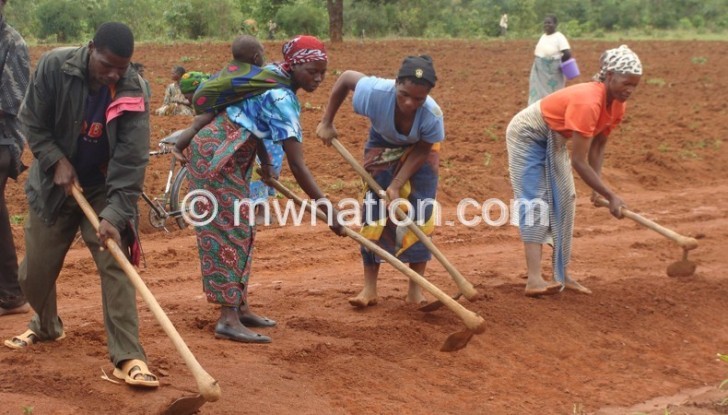Should govt let communities identify own development projects?
When Dowa District Council asked village head (VH) Mengwe to draw a list of prospective beneficiaries of the productive safety nets public works programme (PWP), she made a decision that surprised many.
She refused to go by the wind to enlist better-off families to benefit from the programme, which Local Development Fund (LDF) is implementing in the district with funding from the World Bank through the Malawi Social Action Fund (Masaf IV).

Instead, Mengwe gave priority to the most vulnerable such as those living with HIV and Aids, female and child-headed households.
The female chief further surprised officials at the council with the projects her community proposed for financing.
“We have received very brilliant project proposals from the villagers. I don’t think this would have been the case if the projects were merely imposed on beneficiary communities.
“They are proposing projects that have direct impact on their livelihoods,” says director of Planning and Development (DPD) for Dowa Emmanuel Bulukutu.
Mengwe One, a village behind Dzaleka Refugee Camp in Dowa, is one of the communities in traditional authority (T/A) Mkukula earmarked to benefit from the productive safety net programme.
At least 12 490 poor and ultra-poor people are expected to benefit from the programme, according to Bulukutu.
The productive safety nets programme aims to provide transfers to poor households through participation in community-driven public works thereby creating assets and providing temporary employment in the same communities for specified timeframes.
The project will run for three cycles for the next three years, translating into nine cycles.
The targeted beneficiaries will work for 24 days in each cycle for K600 per day. This means each beneficiary will cart home K14 400 per cycle.
LDF executive director Charles Mandala says the cycles have deliberately been spread to increase impact on household level incomes and food security and reduce households’ exposure to risks associated with climate change and other disasters.
Mandala emphasises that based on this design, the component will support creation of productive assets by providing employment to ultra-poor people with labour at a prescribed wage rate who are unable to find alternative employment who would through such engagements be able to buy their household assets and also create community assets by working on public works sub-projects.
He says the PPW programme approach is unique in such a way that it allows beneficiary communities to identify projects based on their collective need through the catchment management approach.
“LDF simply challenges beneficiary communities to develop their own village level action plans (VLAP) for financing,” he explains.
The programme lays its emphasis on interventions that are designed to minimise the adverse effects of natural disasters and improve land productivity by using integrated bio-physical, social and economic techniques in a hydro logically defined area with an aggregation of hotspots, says Mandala.
“We are going to implement these projects in a number of districts. But Dowa came out tops in designing the best VLAP approaches in the country. Communities in this district have identified a number of projects for financing, including forestry, irrigation farming, agriculture, fisheries and road infrastructure and maintenance, among other interventions,” he narrates.
Mengwe Village has settled for three projects: forestry, irrigation farming and road maintenance.
But Mengwe observes that greed, desperation and the need for basic fuel has led to desertification not only in Dowa, but the whole country at large.
Hence, it was resolved among her subjects that the Masaf IV project should help them bring back natural forests through interventions such as tree planting, environmental conservation, among others.
“Irrigation farming was identified to tackle the food shortages, which are becoming a perennial issue nowadays. On the other hand, road infrastructure project will improve transportation of goods and services for my subjects,” explains the chief.
Chairperson of Zidunge village development committee (VDC) Tumeyo Allan hails citizen engagement as not only essential for open government and effective development, but also strengthens the quality of policymaking and service delivery.
Allan expresses optimism that the approach will further improve the level of transparency and social accountability among duty-bearers both at the council and community leaders.
But the VDC chairperson emphasises that effective engagement by a citizen-centric public service requires political support for the genuine devolution of power and decision-making to frontline public servants and professionals—and to the citizens and stakeholders with whom they engage.
Allan says having embraced democracy some decades ago, it is time Malawi had considered moving towards entrenching this culture in all duty-bearers.
“Otherwise, the old system, which put beneficiaries on the sidelines of the projects, did not work to the best of communities’ interests and needs,” he recalls.
LDF had probably heeded the theory and practice of public administration that is increasingly concerned with placing the citizen at the centre of policymakers’ considerations, not just as target, but also as agent.
This theory advances the development of policies and design services that respond to individuals’ needs and are relevant to their circumstances.
Bulukutu expresses hope that the approach is an effective tool for promoting hardworking spirit and a sense of project ownership among beneficiary communities.n





